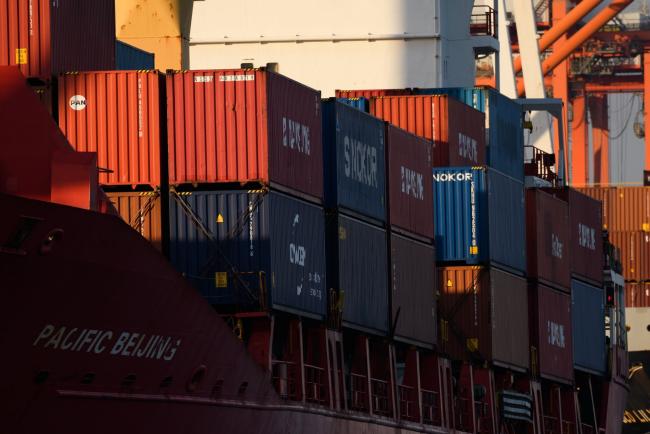(Bloomberg) -- Japanese exports fell for a seventh straight month in June as a slowdown in global growth and uncertainty over trade continued to buffet the world’s third-largest economy.
The value of shipments abroad dropped 6.7% in June from a year earlier, according to the finance ministry, with falling exports of semiconductor components and auto parts among the biggest drags. Economists surveyed by Bloomberg had estimated a 5.4% decline.
The trade balance was a surplus of 589.5 billion yen, aided by a larger-than-expected fall in imports.
Key Insights
- While the prospects for global trade improved a little after the U.S. and China reached a truce on their tariff dispute, the lack of a deal between the two economic giants continues to generate uncertainty for companies and investors.
- Exports to China continued to fall as a slowing economy and trade tensions crimp demand there. Electronic components and chip-making equipment shipments to China dropped well over 20% each, offering an indication of slumping tech demand.
- A persistent drop in exports bodes ill for Japan’s economy, which needs to maintain momentum as it heads toward a consumption-sapping sales tax increase in October.
- The continued falls in exports make it difficult to imagine a recovery in the second half of the year as envisaged by the Bank of Japan, said Takeshi Minami, chief economist at Norinchukin Research Institute. If the Federal Reserve cuts rates multiple times, putting pressure on the yen as the sales tax takes effect, the BOJ will likely need to take some kind of action, he added.
- The U.S. is also in talks with Japan on trade, with Tokyo keen to prevent President Donald Trump slapping tariffs on Japanese automobiles, a move that could shake up one of Japan’s biggest industries and export earners.
- Japan’s restrictions on some important exports for South Korea’s tech sector is an additional risk to the trade outlook.
What Bloomberg’s Economists Say
"Looking ahead, the truce in the U.S.-China trade war in late June reduces the immediate threat of broader U.S. tariffs on Chinese goods. A risk is that Japan’s auto sector becomes a target of U.S. protectionism. Japan’s trade dispute with South Korea is another concern."
The Asia Economist TeamClick here to read more
Get More
- Imports fell 5.2% in June, versus economists’ median estimate of a 0.2% drop.
- Exports to China slid 10.1% in June, while shipments to the U.S. rose 4.8%.
- Shipments to Europe dropped 6.7%.
(Adds economist comments, details.)
